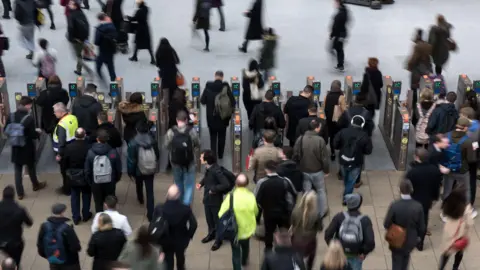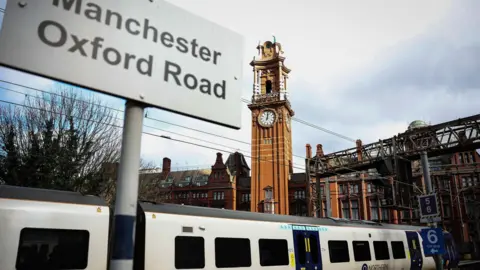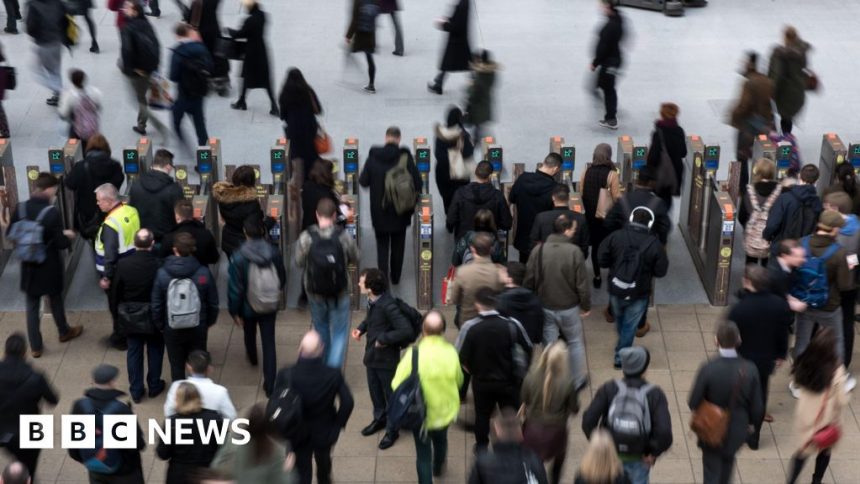Worst major train stations for cancellations named
 Oli Scarff/Getty Images
Oli Scarff/Getty ImagesManchester Victoria has been the worst of Britain’s busiest railway stations for cancellations so far this year.
About one in 10 of 10,506 scheduled stops were cancelled between January and November 2024, according to National Rail figures collected by train data website On Time Trains.
This contributed to the north-west of England being the region with the highest rate of cancelled railway stops across Britain at 6.5%, with 611,047 cancellations.
The government said it was committed to delivering the biggest overhaul of the railways in a generation, bringing services back into public ownership to reinvest in them.
Meher, 22, a recent graduate from Bolton, has experienced regular cancellations at Manchester Victoria.
She said as a student in Preston, she had probably missed hundreds of hours of university because of train cancellations.
“I think most of the time, we were more stressed about our trains than our work,” she said. “It was mostly at evening time when we were heading back, so we were coming home later than expected and missing quite a bit of mosque.”
Meher said cancelled trains had meant travelling home in the dark more often, adding: “If it’s darker, then it’s much worse and you’re alone as well. It does impact your safety.”

Daniel, 19, who also commutes to university via Manchester Victoria, said he usually aimed to arrive an hour early in anticipation of cancellations disrupting his journey.
Although living at home meant he saved money, he said relying on trains had proven stressful.
“A lot of my friends live on campus and they have it much easier – but I wouldn’t like to pay for accommodation,” he said.
More than three million train stops in Britain have been cancelled from January to November this year – 3.8% of the nearly 83 million scheduled.
This breaks down into a 3.9% cancellation rate in England and Wales and 2.9% in Scotland.
BBC analysis calculated the percentage of scheduled stops with a cancelled arrival and/or departure by using National Rail data collected by On Time Trains.
This differs from the cancellation analysis by the Office of Rail and Road (ORR), which factors in full and partial cancellations, planned timetable changes, strikes and reduced staffing.
Amber, 21, travels from Liverpool Lime Street regularly, but said her train was cancelled about 25% of the time.
“It’s annoying that the minimum service isn’t being adhered to,” she said. “It would be unheard of down south.
“Cities up north have to just deal with it, because there’s no other option.”
Liverpool Lime Street had the 11th highest cancellation rate of any station in Britain, with 12,062 trains (5.9%) cancelled between 1 January and 30 November this year.
Of the 100 railway stations in Britain ranked busiest by the ORR, three of the five worst for cancellations were in Manchester: Manchester Victoria (9.5%), Manchester Oxford Road (8.1%) and Manchester Piccadilly (6.7%).
In England, the regions with the worst overall cancellation rates were the North West on 6.5%, followed by the South West on 4.8% and the North East on 4.6%.
Three of the five areas across Britain with cancellation rates below the overall national rate were in the south or east of England.
 Campaign for Better Transport
Campaign for Better TransportMichael Solomon Williams, from transport charity Campaign for Better Transport, said passengers in the North had “suffered for far too long”, with “far more” investment made in the South.
“There’s been a case of economic and social inequality which has been directly related to transport inequality over a number of years,” he said.
“We need to invest more in the north than in the south to rebalance things.”
Network Rail manages 20 of Britain’s busiest and biggest stations. It leases the rest to train operating companies who manage them but are not responsible for the punctuality of other operators using the stations.
Rail Delivery Group, which represents National Rail and train operators, said cancellations could be caused by weather, industrial action, trespass and track, train or signalling faults.
It said this was not acceptable and everyone was working hard to ensure train services were reliable and punctual.
 EPA-EFE/REX/Shutterstock
EPA-EFE/REX/ShutterstockNorthern, which manages Manchester Victoria and Manchester Oxford Road stations, said it had been working hard to address train crew availability issues, to improve reliability.
It said a rest day working agreement had been reached with drivers and it would continue to work with the RMT union to find a “new way forward” after conductors recently rejected an offer relating to Sunday working.
The RMT said it was seeking further talks with the company.
Network Rail, which manages Manchester Piccadilly station but does not run train services, said its job was to “help keep passengers safely on the move”.
It said it understood how frustrating disruption was for passengers and it supported train operators at the station to deliver a reliable service.
A Department for Transport spokesperson said: “Passengers are being let down by poor services, which is why we are committed to delivering the biggest overhaul of the railways in a generation.”
They said bringing services back into public ownership would put passengers at the heart and allow the government to reinvest in railways, while holding operators to account.






